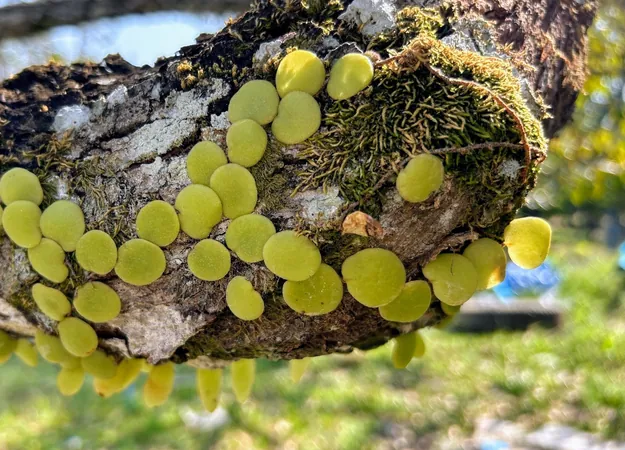
Scientists Uncover Bold New Method to Defeat Parasitic Weeds!
2025-03-23
Author: Emma
For centuries, farmers have fought against the relentless threats to their crops, including droughts, pests, and poor soil. Among the most insidious adversaries are parasitic weeds, which have silently wreaked havoc on agriculture, putting food security at serious risk.
These parasitic plants cannot grow independently; they latch onto healthy crops, siphoning essential nutrients and water. The impact can be catastrophic, especially in regions already struggling with hunger, where every crop loss exacerbates the plight of vulnerable communities.
In a groundbreaking study conducted by researchers at the University of California, Riverside (UCR), scientists believe they may have hit upon an ingenious solution: tricking these parasitic weeds into self-destruction through their own biological signals. This research opens a new frontier in agricultural pest control, promising hope for farmers battling these invasive threats.
Parasitic Weeds: A Hidden Epidemic
In sub-Saharan Africa and parts of Asia, crops like rice and sorghum fall victim to these parasitic invaders, resulting in massive losses. Unlike ordinary weeds, which compete for resources, these weeds embed themselves directly into the host plant's root system. Their insatiable appetite for nutrients severely diminishes crop yields, contributing to hunger and economic despair.
Desperate for a remedy, many farmers in these regions have limited access to powerful herbicides or advanced agricultural technology, leaving them vulnerable to the encroachment of parasitic weeds. Thus, the UCR researchers' initiative offers the promise of a much-needed solution.
Understanding the Hidden Signals
At the core of this innovative approach lies a unique class of plant hormones known as strigolactones. These hormones play a dual role: they regulate growth and root system development while also communicating with beneficial fungi in the soil. However, they also serve as a beacon for parasitic weeds, prompting them to germinate when detected.
Plant biologist David Nelson, a co-author of the study, explained, "When these weeds sense strigolactones, they interpret this as an invitation to grow. Our research aims to exploit this instinct against them."
The Clever Trick: Making Weeds 'Commit Suicide'
What if researchers could trigger weeds to germinate when no host plants were available? By releasing synthetic strigolactones at inopportune times, this trick could lead parasitic weeds to sprout, only to find themselves without a host and ultimately die off.
"This is akin to flipping their own switch on them," Nelson noted. This strategy has practical implications, especially considering that certain parasitic plants, like broomrape, can lie dormant for years before being activated by these hormones.
Advancements in Synthetic Hormone Production
To put this approach into practice, scientists needed a method to produce strigolactones outside of plants. The breakthrough came through microbial engineering, where UCR researchers created a system utilizing engineered bacteria and yeast to act as hormone factories.
This ability to produce and analyze strigolactones in a controlled environment enables researchers to explore new avenues for synthetic hormone applications, potentially creating affordable tools for farmers worldwide.
The Road Ahead: Testing and Applications
The research also sheds light on the evolutionary biology behind strigolactones, allowing scientists to better understand their function and refine synthetic versions for targeted use against specific parasitic weeds. Ongoing tests are conducted in realistic agricultural settings, where varying soil types, weather conditions, and local ecosystems may influence outcomes.
As Nelson stated, "We are fine-tuning the chemical signals to maximize their effectiveness against parasitic weeds, which could revolutionize how farmers protect their crops."
Larger Implications and Future Prospects
While the primary goal of this study was to combat parasitic weeds, the implications of strigolactones could extend far beyond crop protection. Preliminary research hints at potential applications in medicine, such as anti-cancer or anti-viral properties, as well as addressing diseases like citrus greening that have devastated agricultural industries.
This research represents a promising countermeasure against a perennial threat to food security, showcasing how understanding and manipulating plant signals can empower farmers and safeguard our dwindling natural resources.
As scientists continue their research, the potential of this innovative approach to reshape agricultural practices and improve food security becomes increasingly apparent. With ongoing advancements and dedicated efforts, this clever solution could indeed turn the tide against one of nature's sneakiest adversaries.
Stay tuned for updates as this fascinating study paves the way for a revolutionary shift in how we combat agricultural pests and protect our global food supply!









 Brasil (PT)
Brasil (PT)
 Canada (EN)
Canada (EN)
 Chile (ES)
Chile (ES)
 Česko (CS)
Česko (CS)
 대한민국 (KO)
대한민국 (KO)
 España (ES)
España (ES)
 France (FR)
France (FR)
 Hong Kong (EN)
Hong Kong (EN)
 Italia (IT)
Italia (IT)
 日本 (JA)
日本 (JA)
 Magyarország (HU)
Magyarország (HU)
 Norge (NO)
Norge (NO)
 Polska (PL)
Polska (PL)
 Schweiz (DE)
Schweiz (DE)
 Singapore (EN)
Singapore (EN)
 Sverige (SV)
Sverige (SV)
 Suomi (FI)
Suomi (FI)
 Türkiye (TR)
Türkiye (TR)
 الإمارات العربية المتحدة (AR)
الإمارات العربية المتحدة (AR)